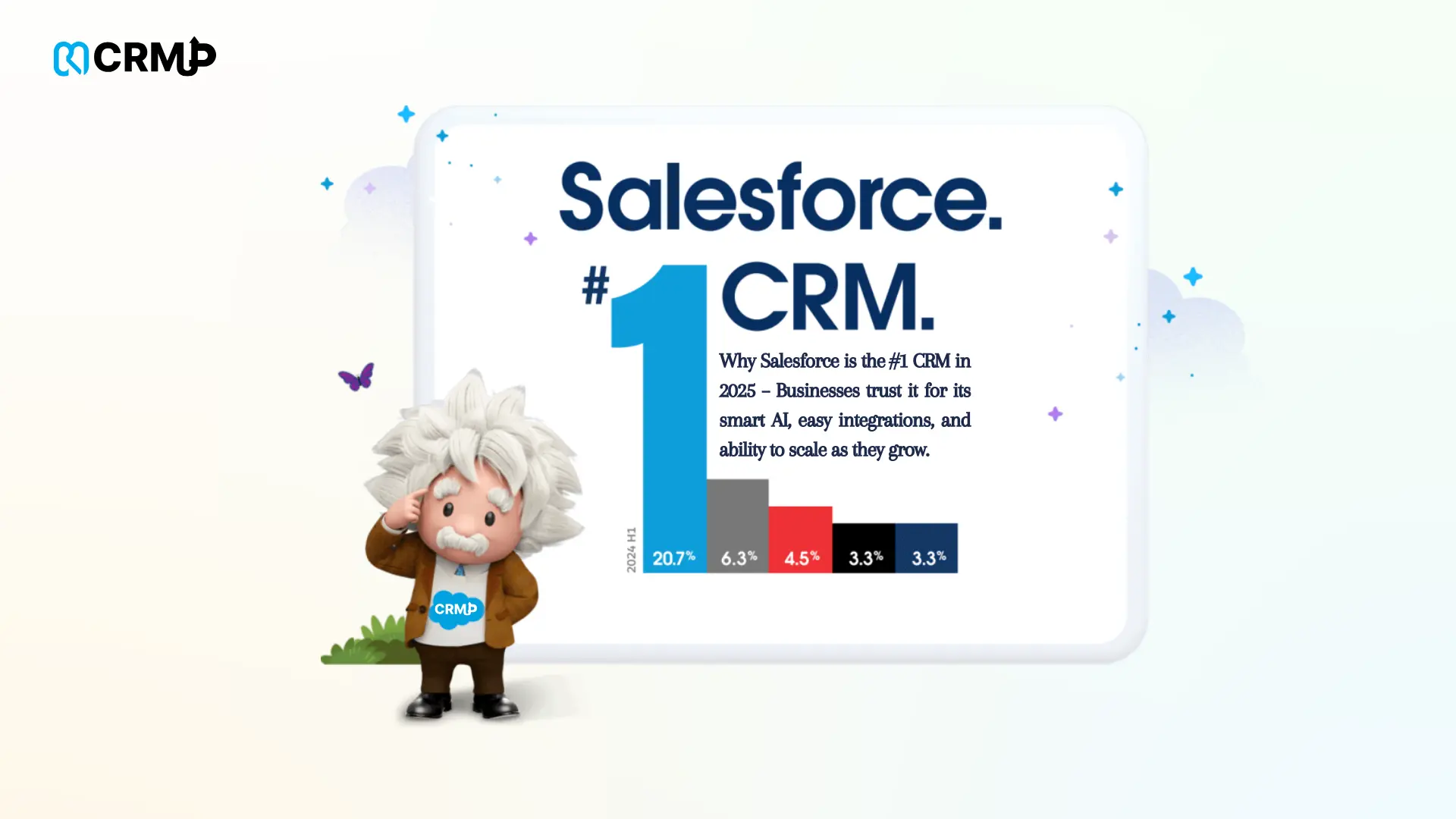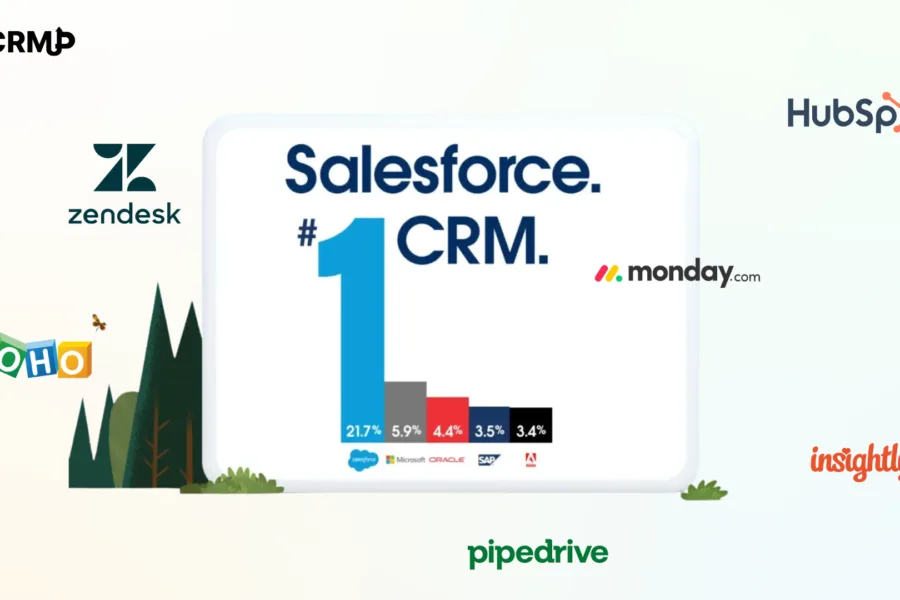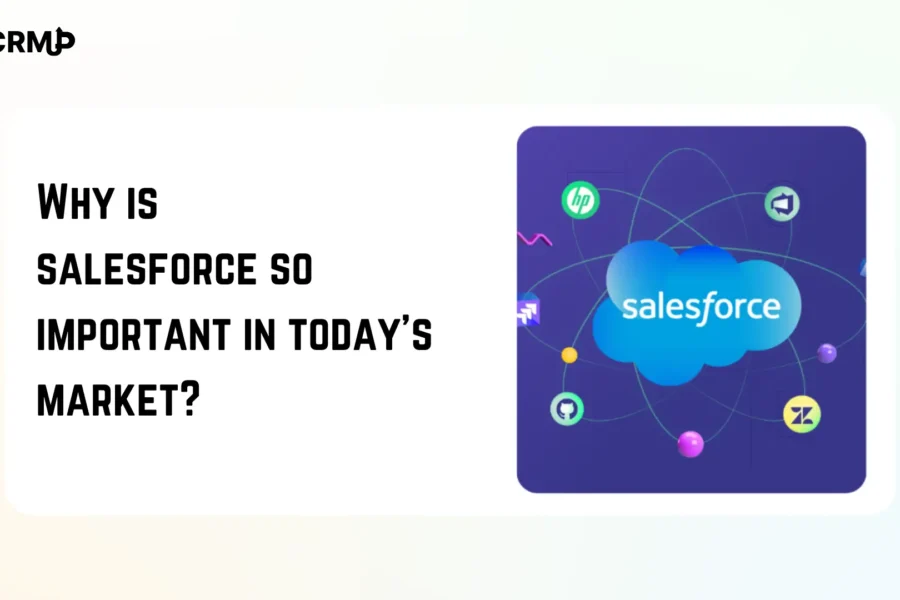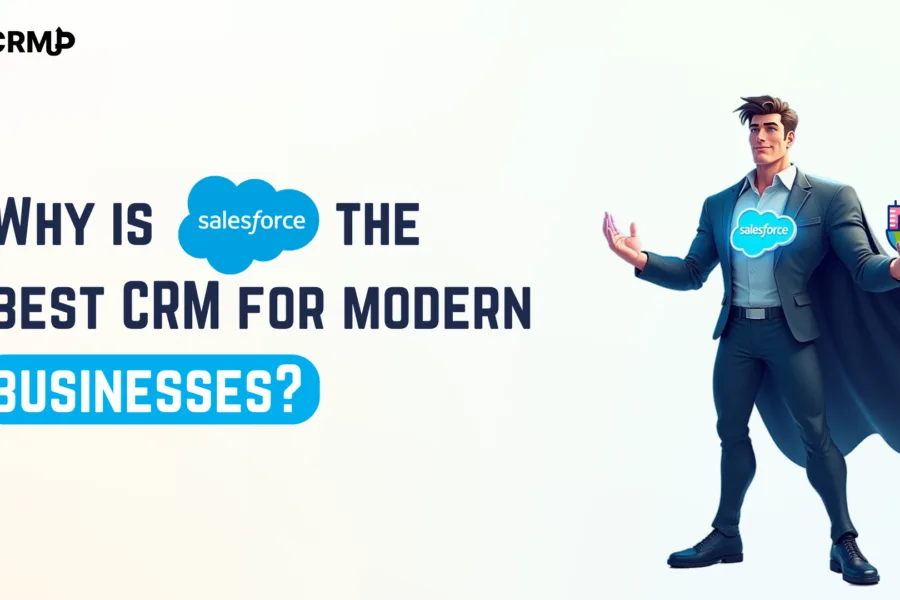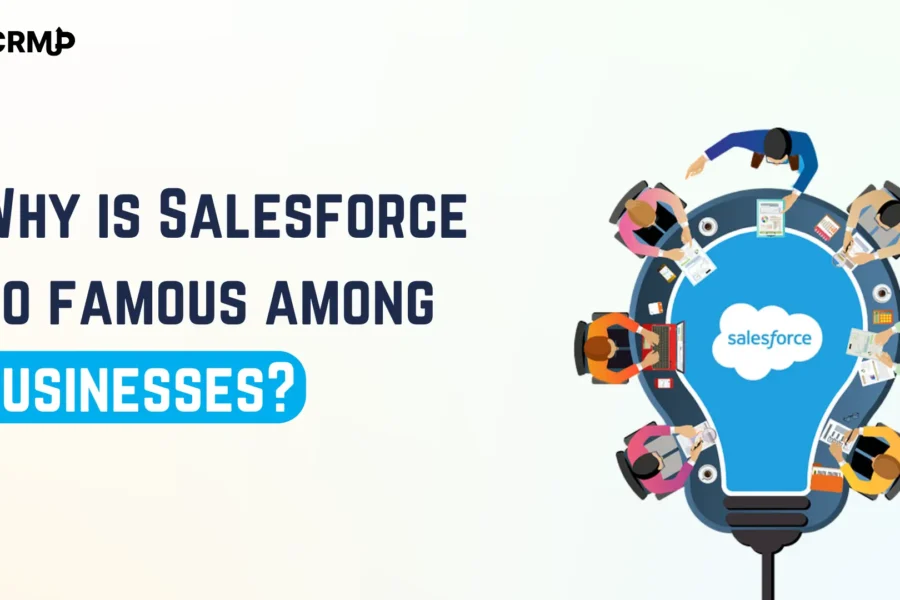Today, I’ll show you why Salesforce leads the CRM market in 2025 and how it stays ahead with data-backed insights from Adobe and industry trends.
No fluff. No vague claims.
I’ll break down why Salesforce is the #1 CRM, covering its AI-driven features, scalability, and real-world performance—all supported by the latest 2025 CRM market trends.
Salesforce maintains its leadership with a 21.7% market share, thanks to innovations like Agentforce 2.0, which boosts productivity and integrates seamlessly with platforms like Slack. Source: Salesforce
Let’s get started.
What Is Salesforce?
Salesforce is a cloud-based CRM platform that helps businesses manage sales, marketing, and customer service in one system.
It stores customer data, tracks interactions, and automates workflows to improve efficiency and strengthen customer relationships.
Key Features of Salesforce
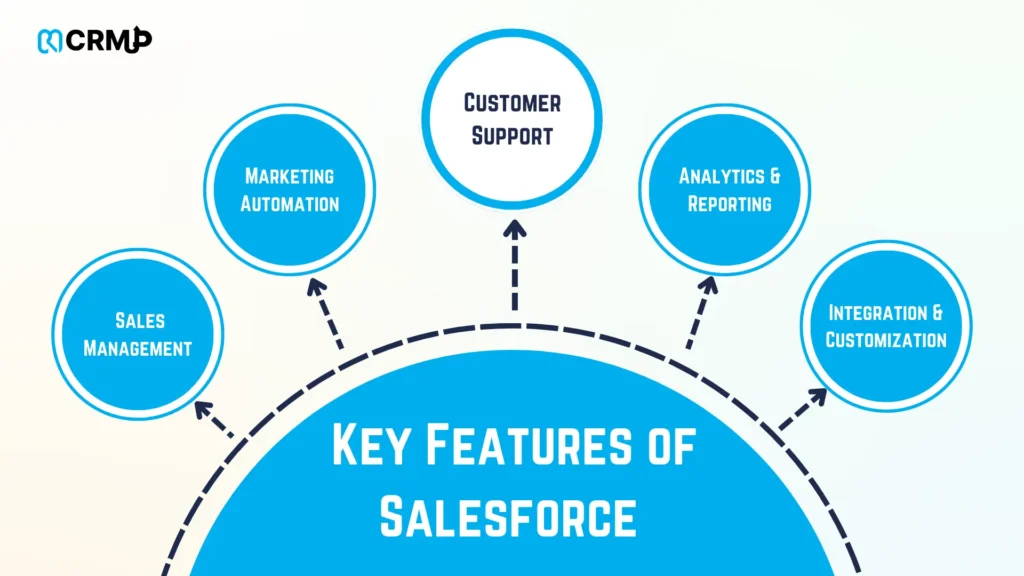
Sales Management – Salesforce boosts sales productivity by 44% by automating lead tracking, sales forecasting, and pipeline management. Companies using Salesforce increase revenue by 25% on average.
Marketing Automation use businesses that use Salesforce Marketing Cloud see a 30% improvement in campaign efficiency. Source: Digital Alchemy
AI-powered insights help companies send personalized messages that drive higher engagement.
Customer Support – Salesforce Service Cloud reduces case resolution time by 31%, improving customer satisfaction. AI-powered chatbots can automatically handle 20–30% of customer inquiries.
Analytics & Reporting – Salesforce Einstein AI provides predictive insights, helping businesses make data-driven decisions 42% faster. Companies using Salesforce analytics improve forecasting accuracy by 38%.
Integration & Customization – Businesses can integrate Salesforce with over 4,000 apps from the Salesforce AppExchange. 91% of Salesforce users say its customization features help meet their specific needs.
How Salesforce Helps Businesses Grow
Salesforce keeps sales, marketing, and support teams connected, making customer interactions more efficient. Companies using Salesforce report:
📈 25% higher revenue, thanks to better customer engagement and automated sales processes.
⚡ 35% faster deal closing rates, as teams access real-time insights into customer interactions.
🔄 45% better customer retention, due to automated follow-ups and personalized service.
With AI-driven tools, automation, and unmatched scalability, Salesforce helps businesses grow, close deals faster, and keep customers happy.
Who Uses Salesforce?
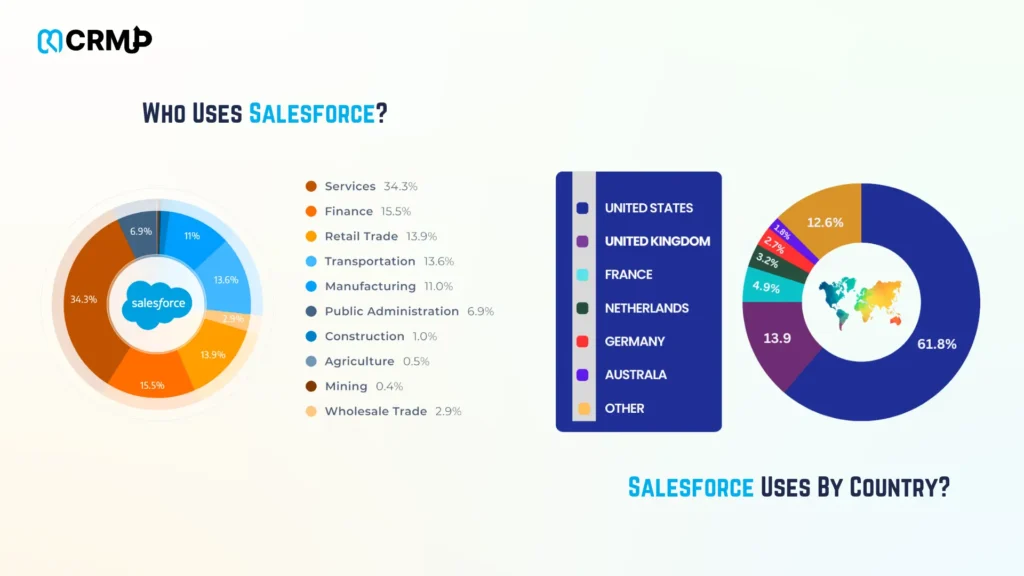
Businesses use Salesforce to manage sales, marketing, and customer service more efficiently. It helps companies track customer interactions, automate tasks, and improve decision-making.
Its flexibility and scalability make it a top choice for small businesses, mid-sized companies, and large enterprises.

See How CRMup Helps You Get More Customers (Without the Busywork)
CRM Setup – We set up your CRM the right way so you can track leads and deals without the headache.
Sales Automation – Follow-ups, reminders, and tasks? We automate them so you can focus on closing.
Smart Workflows – No more messy processes. We streamline your day so everything just flows.
Salesforce for Businesses of All Sizes
Salesforce helps small businesses, mid-sized companies, and large enterprises manage customers, Simplify processes, and increase efficiency.
Small Businesses – Small companies use Salesforce to track leads, automate follow-ups, and improve customer relationships.
A HubSpot study found that 52% of small businesses increase customer retention with a CRM. Salesforce provides simple tools and automation that help small businesses stay organized and compete with larger companies. Source: Fit Small Business
Mid-Sized Companies – Mid-sized businesses use Salesforce to manage sales, connect with apps, and analyze customer data.
AI-powered insights help companies forecast revenue, improve marketing, and personalize interactions. Automating tasks with Salesforce saves time and boosts productivity.
Large Enterprises – Large companies use Salesforce to store customer records, automate workflows, and manage global operations.
Forbes reports that over 90% of Fortune 500 companies use Salesforce for data-driven decision-making and customer management.
Its security, AI tools, and analytics help enterprises streamline operations and improve performance.
Salesforce gives businesses the tools to increase efficiency, grow sales, and improve customer service.
Industries That Use Salesforce
Finance & Banking – Banks use Salesforce to track customer accounts, automate processes, and ensure compliance. Clients include Bank of America, American Express, and HSBC.
Healthcare & Life Sciences – Hospitals, pharmaceutical companies, and insurers use Salesforce to manage patient records, support telehealth, and improve care coordination. Johnson & Johnson, Humana, and Pfizer use Salesforce to enhance healthcare management.
Retail & E-commerce – Retailers use Salesforce to personalize customer experiences, run marketing campaigns, and analyze shopping behavior. Companies like Walmart, Adidas, and L’Oréal use it to increase sales and customer engagement.
Technology & Software – Tech companies use Salesforce to manage clients, streamline B2B sales, and track software adoption. IBM, Spotify, and AWS use Salesforce to enhance customer service and optimize sales pipelines.
Manufacturing & Automotive – Manufacturers and automakers use Salesforce to track supply chains, manage dealer networks, and improve post-sale services.
Companies like Ford, Michelin, and Caterpillar integrate Salesforce into their operations.
Top Companies Using Salesforce
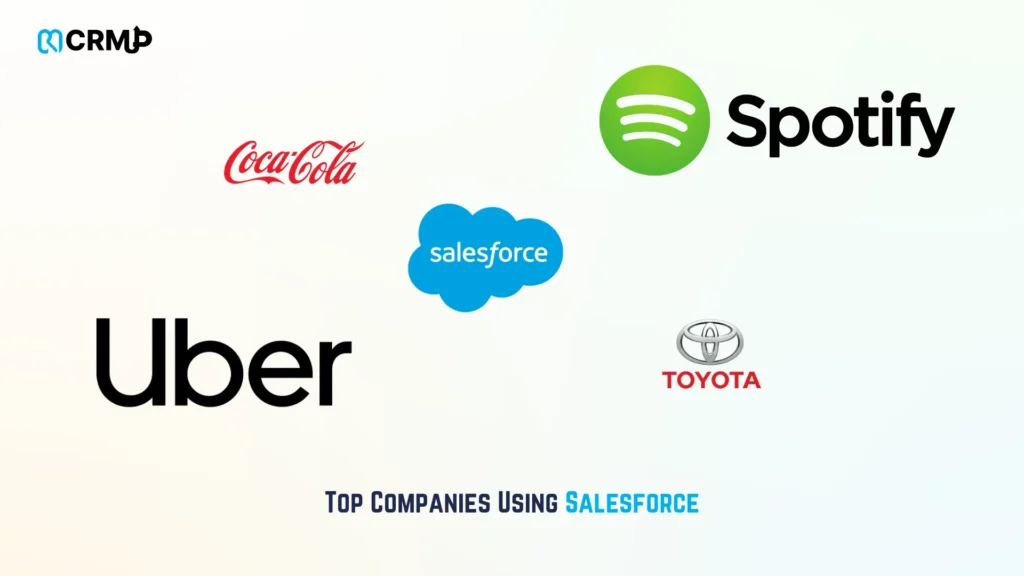
World-top companies use Salesforce to manage customer relationships, handle repetitive work, and improve efficiency.
Businesses in automotive, technology, retail, and finance rely on its AI-powered tools to increase sales and improve customer service.
Coca-Cola – Tracks customer interactions and automates marketing campaigns with Salesforce. The system helps Coca-Cola personalize promotions, boost engagement, and drive sales.
Toyota – Manages dealer networks and customer service using Salesforce. The platform helps Toyota track customer preferences, streamline support, and improve dealer communication.
Uber – Analyzes customer feedback and optimizes support services through Salesforce. Automation helps Uber resolve issues faster and enhance rider and driver experiences.
Spotify – Uses Salesforce AI to analyze user behavior and personalize music recommendations. The platform helps Spotify refine marketing strategies and keep users engaged.
Companies trust Salesforce to optimize operations, strengthen customer relationships, and increase revenue. Its AI-powered CRM tools and automation help businesses work faster and serve customers better.
Why Salesforce is the Number 1 CRM in 2025?
They say money can’t buy happiness, but have you ever seen a sales team using Salesforce? Their closed deals, automated workflows, and AI-powered insights might indeed prove otherwise.
Consequently, Salesforce leads the CRM market in 2025 because businesses trust it to manage sales, marketing, and customer service efficiently.
Furthermore, companies choose Salesforce over any other CRM because it scales with business growth and also integrates with essential tools.
Startups, small businesses, and Fortune 500 companies rely on Salesforce to streamline operations and improve customer relationships.
Its AI-powered automation removes repetitive tasks, so teams focus on selling and improving customer experiences.
Gartner’s Magic Quadrant has named Salesforce the top CRM for over ten years. It continues to lead with AI-driven automation, real-time data insights, and smart integrations.
Businesses make faster decisions, improve workflows, and increase productivity with Salesforce.
In 2025, CRM trends focus on AI automation, personalized customer experiences, and seamless software integrations.
Salesforce drives these changes by offering intelligent tools that help businesses close deals faster and serve customers better.
Its ability to innovate and adapt keeps it the most trusted CRM worldwide—and the reason why sales teams keep winning.
How Did Salesforce Become the World’s Leading CRM?
Salesforce leads the CRM industry by driving innovation, acquiring key companies, and improving its platform. It changed how businesses manage customers, track sales, and automate work.
By moving CRM to the cloud, Salesforce made customer data accessible from anywhere, helping businesses grow faster.
A History of Innovation and Growth
Marc Benioff, Parker Harris, Frank Dominguez, and Dave Moellenhoff founded Salesforce in 1999 in San Francisco. They wanted to replace expensive, on-premise CRM software with a cloud-based system.
Before Salesforce, companies installed CRM software on internal servers, which required large budgets and IT teams.
Salesforce changed this by offering a web-based CRM that businesses could access without complex installations.
SaaS Model: A New Way to Use CRM
Salesforce introduced Software-as-a-Service (SaaS), allowing companies to pay a subscription fee instead of purchasing software licenses. This made CRM affordable and scalable.
Salesforce launched its first product in 2000. By 2004, it went public, raising $110 million and attracting more customers.
Expanding Through Acquisitions
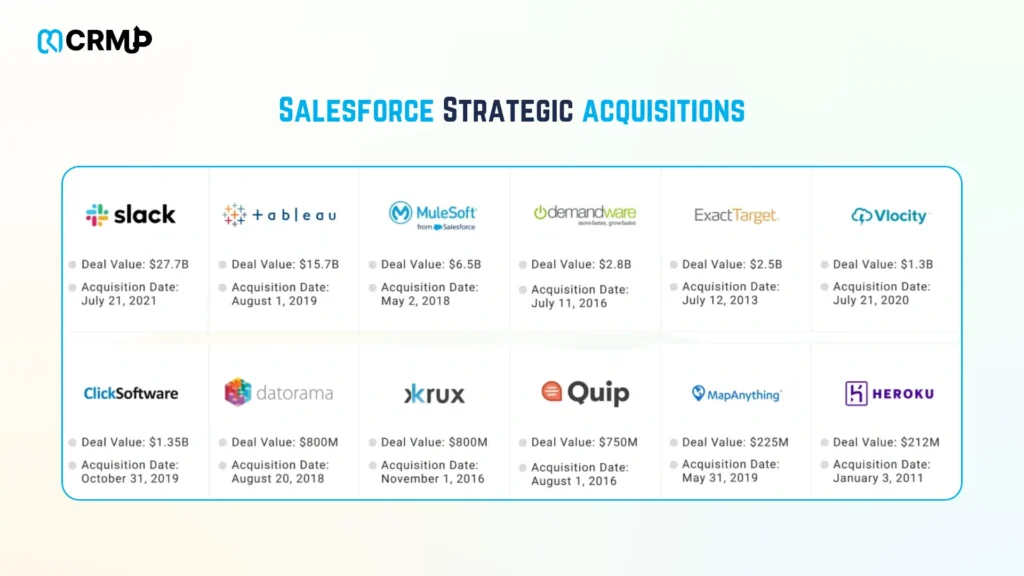
Salesforce grew rapidly by acquiring companies that added value to its platform. Some of its biggest acquisitions include:
Slack (2021, $27.7 billion) – Added messaging and team collaboration.
Tableau (2019, $15.7 billion) – Improved data analysis and visualization.
MuleSoft (2018, $6.5 billion) – Enhanced system and app integration.
ClickSoftware (2019, $1.35 billion) – Strengthened field service automation.
These acquisitions helped Salesforce improve communication, connect data, and automate workflows.
From Classic to Lightning: Evolving the Platform
Salesforce has continually improved its platform:
Salesforce Classic (1999-2015) provided essential CRM tools for sales tracking, customer management, and reporting.
Lightning Experience (2015-Present) introduced faster navigation, AI-powered insights, and automation tools to improve efficiency.
Salesforce remains the #1 CRM because it adapts to business needs, invests in AI, and focuses on automation. Its commitment to innovation and growth helps companies sell smarter, serve customers better, and scale faster.
Unmatched Market Share and Industry Recognition
Salesforce holds a 23.8% CRM market share, according to the IDC 2024 report. It outperforms Microsoft, SAP, and Oracle, providing businesses with AI-driven automation, real-time insights, and seamless integrations.
Companies choose Salesforce because it simplifies sales, marketing, and customer service, helping teams work faster and more efficiently.
For 14 consecutive years, Gartner has ranked Salesforce as the #1 CRM in its Magic Quadrant report.
This recognition highlights Salesforce’s ability to help businesses manage customer relationships, automate workflows, and improve decision-making.
Its AI tools give companies instant insights, allowing sales teams to close deals faster and improve customer interactions.
More than 150,000 businesses, including Amazon, Adidas, and T-Mobile, use Salesforce to track sales, automate workflows, and personalize customer experiences.
These companies benefit from its robust capabilities, which enhance operational efficiency and improve client interactions.
Its platform enables businesses to increase efficiency, drive revenue growth, and improve overall performance.
By combining automation, AI, and cloud-based solutions, Salesforce remains the top CRM choice for companies worldwide.
What Features Make Salesforce the #1 CRM?
Salesforce leads the CRM market by providing AI-powered automation, predictive analytics, and personalized customer interactions.
These features help businesses streamline sales, improve efficiency, and make smarter decisions.
AI-Powered Automation and Predictive Analytics
Salesforce Einstein AI automates sales tasks, predicts trends, and delivers real-time insights. It analyzes customer data, helping sales teams identify leads, forecast revenue, and close deals faster.
By automating repetitive tasks, teams focus on high-value activities that drive growth.
AI-driven solutions like chatbots, lead scoring, and sentiment analysis improve customer interactions. Chatbots handle routine inquiries, allowing support teams to solve complex issues.
Lead scoring ranks prospects based on engagement, helping sales teams prioritize the best opportunities.
Sentiment analysis tracks customer feedback, allowing businesses to respond quickly and improve service.
Generative AI personalizes customer communication at scale. It creates custom emails, product recommendations, and targeted marketing campaigns based on customer data.
Businesses use this technology to increase engagement, improve retention, and drive sales.
Salesforce combines AI, automation, and data analytics to help businesses sell smarter, serve customers better, and grow faster.
Its predictive insights and real-time data keep companies ahead of the competition while making CRM management simpler and more effective.
Industry-Specific CRM Solutions for Maximum Customization
Salesforce provides CRM solutions for different industries. Businesses use these tools to manage sales, automate workflows, and improve customer interactions.
Companies can choose pre-built solutions or build custom applications with simple development tools.
Solutions for Sales, Marketing, and Customer Service
Sales Cloud – Helps sales teams track leads, manage pipelines, and close deals faster.
Service Cloud – Automates customer support with AI chatbots, case tracking, and self-service portals.
Marketing Cloud – Uses AI to analyze customer data, run targeted campaigns, and measure engagement.
Commerce Cloud – Enables businesses to sell products online and improve the shopping experience.
Industry-Specific CRM Solutions
Financial Services Cloud – Helps banks and insurance companies manage clients, track transactions, and meet compliance requirements.
Health Cloud – Supports healthcare providers in storing patient records, managing telehealth, and tracking treatments.
Manufacturing Cloud – Assists manufacturers in forecasting demand, managing supply chains, and optimizing production.
Custom Applications with Low-Code and No-Code Tools
Salesforce allows businesses to build custom applications without coding. Companies can modify workflows, add new features, and integrate third-party tools using drag-and-drop tools in AppExchange.
Salesforce solutions help businesses increase efficiency, streamline operations, and enhance customer relationships.
Seamless Integrations and API-First Architecture
Salesforce connects different systems using its API-first architecture. Mulesoft enables businesses to integrate ERP systems, e-commerce platforms, and third-party applications.
These connections help companies manage data efficiently and automate processes.
Salesforce works with Google Workspace, Microsoft 365, AWS, and SAP, ensuring teams can access and share information in real time.
Whether businesses use cloud-based or on-premise tools, Salesforce keeps data synchronized across platforms.
The open API system lets businesses build custom workflows. Companies can automate operations, sync databases, and integrate external tools to improve operations.
With seamless connectivity, Salesforce helps businesses save time, reduce manual work, and make faster decisions.
Why Do Businesses Prefer Salesforce Over Other CRMs?
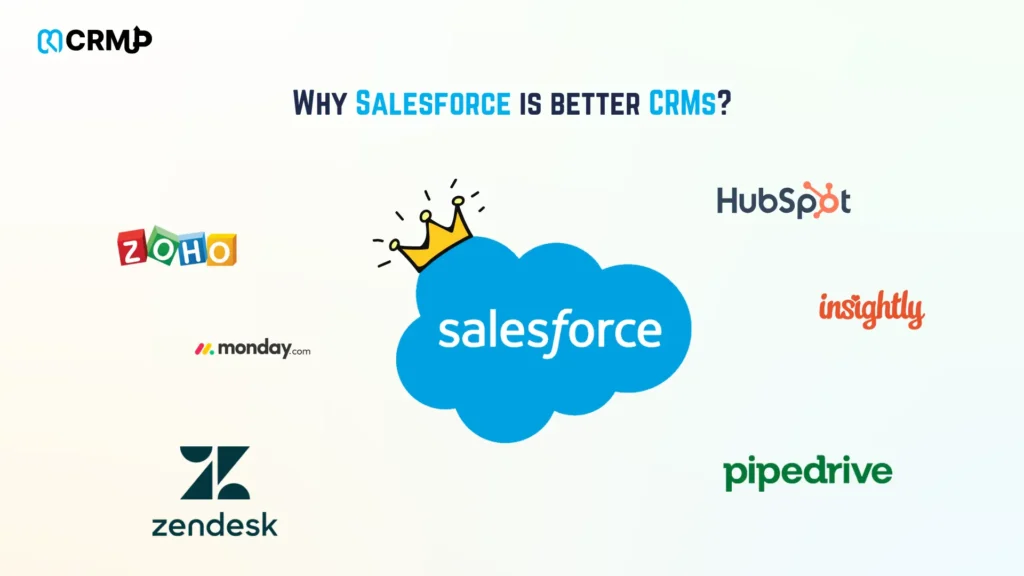
Businesses choose Salesforce because it automates tasks, connects teams, and grows with their needs.
Its Smart CRM functionalities, industry-specific solutions, and strong support make it the go-to CRM for companies worldwide.
Market Share and Global Customer Adoption
Trusted by Fortune 500 Companies, More than 90% of Fortune 500 companies use Salesforce to manage sales, marketing, and customer service.
Used Across Industries, businesses in finance, healthcare, retail, and manufacturing rely on Salesforce to streamline operations and improve customer experiences.
Built by Millions of Developers, over 4.5 million developers create custom applications on Salesforce, helping companies expand CRM features and adapt to specific needs.
Salesforce stays ahead because it scales with businesses, delivers AI-driven insights, and simplifies customer management.
Superior Customer Experience and 24/7 Support
Salesforce helps businesses improve customer interactions through learning tools, multi-channel support, and unified data management.
Trailhead, its free learning platform, gives users, administrators, and developers the knowledge they need to manage CRM functions.
Companies train their teams in automation, AI, and data management without extra costs.
Salesforce offers support through chat, phone, email, and self-service portals. AI chatbots handle routine questions, while live agents assist with complex issues.
Quick responses reduce downtime and improve efficiency, allowing businesses to focus on customer needs.
Customer 360 creates a single profile for each customer by collecting data from different sources.
Businesses use this tool to track interactions, send personalized offers, and improve service.
With a complete customer view, companies make better decisions and build stronger relationships.
Continuous Innovation and Industry Leadership
Salesforce invests over $10 billion each year in research and development, improving AI, automation, and blockchain technology.
These advancements help businesses increase productivity, reduce manual work, and secure customer data.
AI tools provide insights into customer behavior, while blockchain strengthens security and transparency.
Dreamforce, Salesforce’s annual event, connects industry leaders, developers, and customers.
The event showcases new technologies, business strategies, and CRM advancements, keeping businesses informed and competitive.
Salesforce also focuses on sustainability with Net Zero Cloud, a tool that helps businesses track and lower carbon emissions.
Companies monitor energy use, measure environmental impact, and work toward sustainability goals.
Salesforce gives businesses the tools to operate efficiently while reducing their environmental footprint.
How Salesforce Helps Businesses Increase Revenue
Salesforce helps businesses grow revenue by automating sales, improving data insights, and personalizing customer interactions.
Its AI-driven tools allow sales teams to prioritize leads, close deals faster, and engage customers more effectively.
AI-Driven Sales Automation and Lead Prioritization
Salesforce uses AI to help sales teams focus on the most valuable leads.
Einstein Lead Scoring ranks leads based on their likelihood to convert, allowing teams to spend time on the best opportunities.
Pipeline inspection tools track deal progress, helping businesses forecast revenue with greater accuracy.
Revenue Cloud simplifies pricing, billing, and subscription management. Sales teams can send accurate quotes, manage renewals, and close deals faster without manual work slowing them down.
Data-Driven Decision Making with Real-Time Analytics
Salesforce gives businesses real-time insights to improve decision-making. Tableau CRM creates visual reports that track sales performance and highlight trends.
AI-powered recommendations help sales teams adjust strategies and act on data-backed insights.
Automated reporting removes manual data entry, reducing errors and saving time.
Sales teams get up-to-date reports, allowing them to make informed decisions and focus on revenue growth.
Personalized Customer Journeys and Targeted Marketing
Salesforce AI helps businesses create personalized customer experiences. Marketing Cloud AI studies customer behavior and adjusts campaigns to send the right message at the right time.
Predictive analytics identify upselling and cross-selling opportunities, increasing customer value.
Omnichannel engagement connects businesses with customers across email, social media, mobile, and websites, ensuring consistent and relevant interactions.
Salesforce helps businesses sell more, work smarter, and improve customer relationships.
Its AI and automation tools allow companies to increase efficiency, close more deals, and drive revenue growth.
How Secure and Compliant Is Salesforce?

They say, “If you’re not paying for the product, you are the product.” But with Salesforce, security is the product. Businesses trust Salesforce because it protects data, prevents breaches, and meets global compliance standards.
Its security features ensure that only the right people access the right data at the right time.
Enterprise-Grade Security and Data Protection
Salesforce follows a zero-trust security model, which means it verifies every user and device before allowing access.
This prevents unauthorized entry and strengthens system security.
Multi-factor authentication (MFA) requires users to confirm their identity using extra verification steps.
Even if a password is stolen, Salesforce blocks access without the second authentication factor.
Salesforce encrypts data using advanced encryption protocols, protecting information during storage and transmission.
Businesses control access levels, ensuring that only authorized users can view or modify sensitive data.
Salesforce includes disaster recovery and real-time backup systems to prevent data loss.
These tools create automatic backups and allow quick restoration in case of failures or cyberattacks.
The system also tracks suspicious activity and alerts administrators to potential threats.
Compliance with Global Regulations
Salesforce meets strict security and data privacy laws to help businesses stay compliant.
It follows GDPR, CCPA, HIPAA, and SOC 2 regulations, ensuring companies protect customer data, follow privacy laws, and store information securely.
Industry-specific compliance solutions help businesses in regulated sectors.
Financial Services Cloud meets banking and financial security requirements, keeping transactions and client records safe.
Health Cloud supports HIPAA compliance, securing patient data and electronic health records.
Salesforce provides audit trails and governance tools that track user activity and system access.
These tools help businesses generate reports and maintain compliance with regulatory standards.
Salesforce keeps business data secure, compliant, and protected. Its security framework ensures that businesses can operate safely, reduce risk, and maintain customer trust.
Future of Salesforce: What’s Next in 2025 and Beyond?
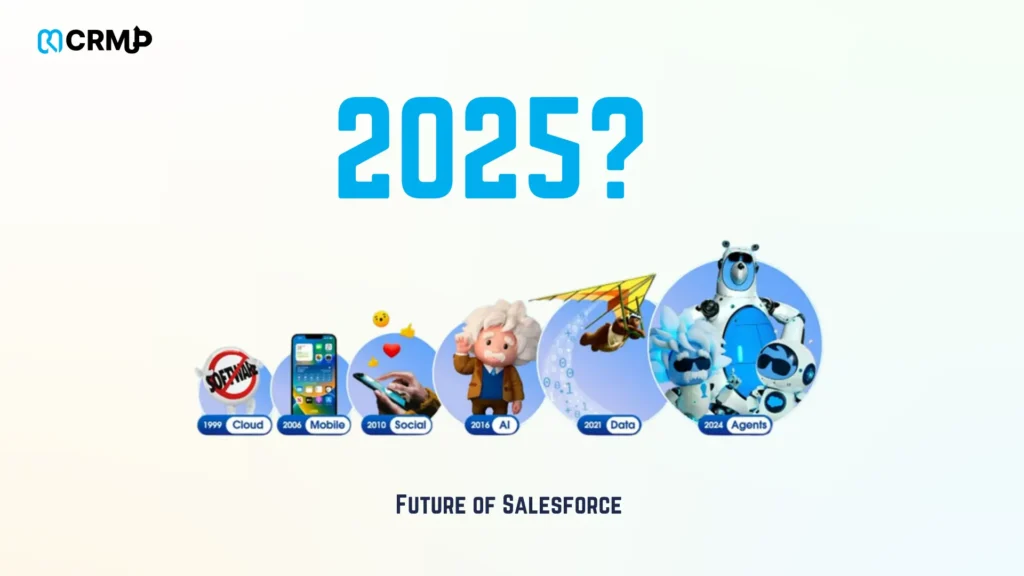
Salesforce keeps pushing boundaries with smarter AI, stronger security, and a bigger global presence.
Businesses will see faster automation, better data protection, and industry-focused solutions.
These updates help companies work more efficiently, keep customer data safe, and expand into new markets.
Expanding AI and Automation Capabilities
Salesforce is making Einstein AI 2.0 smarter with improved natural language processing (NLP) and machine learning.
Businesses will get better customer insights, smarter automation, and faster decision-making.
New AI-powered tools help teams cut manual work and focus on selling.
AI meeting assistants summarize discussions, highlight key points, and suggest follow-ups. Automated email composers draft responses using customer history.
AI-driven sales recommendations guide teams to high-value leads, making sales cycles shorter and more effective.
Blockchain and IoT for CRM Data Security
Salesforce is adding blockchain technology to improve data security and trust. Salesforce Blockchain stores customer records in a secure, tamper-proof ledger.
This prevents unauthorized changes and ensures data accuracy, which is essential for industries like finance, healthcare, and supply chain management.
Salesforce is also boosting Internet of Things (IoT) capabilities.
IoT Cloud connects real-time data from smart devices to Salesforce. Businesses can monitor product performance, predict maintenance issues, and improve customer support.
A company selling smart appliances, for example, can track usage patterns and fix problems before they happen.
Growth in Emerging Markets and Industry Expansion
Salesforce is expanding in Asia-Pacific, Latin America, and Africa, where more businesses are switching to cloud-based CRM solutions.
The company is scaling its infrastructure and customizing solutions for different regions.
Salesforce is also rolling out new tools for government, legal, and education sectors. Government agencies use it to manage records and automate public services.
Law firms track cases, contracts, and client interactions. Schools and universities use Salesforce to manage student records, admissions, and digital learning platforms.
Sustainability remains a focus. Net Zero Cloud helps businesses track carbon emissions, monitor energy usage, and meet environmental goals.
Companies use it to reduce waste, comply with climate regulations, and report sustainability progress.
With smarter AI, stronger security, and a growing global reach, Salesforce is shaping the future of CRM. Businesses can sell faster, protect data, and expand into new markets—all with the power of Salesforce.
Is Salesforce the Right CRM for Your Business?
Choosing a CRM can feel like picking the perfect coffee blend—some options give you instant results, while others grow with you over time.
Businesses often ask, “Why is Salesforce popular?” The answer is simple. Salesforce offers scalability, AI-driven automation, and deep customization.
It helps companies manage sales, marketing, and customer service in one system, making it a trusted choice worldwide.
Key Factors to Consider Before Choosing Salesforce
Salesforce works for startups, small businesses, and large enterprises.
Its flexibility allows businesses to expand CRM functions as they grow.
Companies needing long-term solutions with advanced automation benefit from Salesforce’s ability to handle complex workflows and integrations.
Salesforce offers four pricing tiers—Essentials, Professional, Enterprise, and Unlimited—each designed to match different business needs.
In a Salesforce vs HubSpot comparison, HubSpot offers simple out-of-the-box tools, while Salesforce supports custom automation, AI-driven analytics, and scalability for complex operations.
Customization is a major advantage.
Low-code and pro-code options allow businesses to adjust workflows, add integrations, and build custom applications.
Companies that need detailed automation and AI-powered insights often prefer Salesforce over competitors.
Real-World Success Stories of Salesforce Implementation
Salesforce’s global impact is clear in the success of major brands that use it to increase efficiency and improve customer relationships.
Adidas improved customer engagement by using Salesforce AI to personalize marketing campaigns.
The company analyzed customer preferences and sent targeted promotions, increasing retention and sales.
T-Mobile transformed customer service by integrating Salesforce Service Cloud.
AI-powered automation reduced response times, helping resolve customer issues faster and improve satisfaction scores.
Amazon Web Services (AWS) enhanced B2B marketing by integrating Salesforce with existing business tools. This helped AWS track leads, improve sales forecasting, and strengthen customer relationships.
Maximizing Salesforce Implementation for Increased Return on Investment
To get the best results from Salesforce, businesses need a clear strategy and structured implementation.
1️⃣ Assess Business Needs – Identify sales, marketing, and customer service goals. A Salesforce vs HubSpot comparison shows that while HubSpot works well for basic CRM needs, Salesforce provides advanced automation and scalability.
2️⃣ Migrate Data and Integrate Systems – Transfer existing customer data into Salesforce. Businesses connect it with email, marketing, and analytics tools to ensure smooth operations.
3️⃣ Train Employees – Use Trailhead and Salesforce certifications to educate teams on automation, reporting, and AI-powered analytics.
4️⃣ Automate Workflows – Set up AI-powered automation for lead tracking, customer follow-ups, and campaign management, allowing teams to focus on high-value tasks.
5️⃣ Monitor and Optimize Performance – Use real-time analytics to track success, adjust strategies, and maximize revenue.
They say success leaves clues, and Salesforce’s dominance in the CRM market is no accident.
Businesses trust it because it delivers real results—higher sales, smarter automation, and better customer experiences.
Salesforce helps companies organize customer data, track leads, and streamline workflows.
Its AI-driven automation enables sales teams to close deals faster, predict customer needs, and personalize marketing efforts.
Businesses of all sizes rely on Salesforce. Startups use it to automate tasks and manage leads, while large enterprises scale operations and optimize global sales strategies.
Salesforce works across industries.
Banks, healthcare providers, retailers, and manufacturers use it to secure data, improve workflows, and ensure compliance.
Its customization options and integrations make it adaptable to any business need.
Salesforce leads because it helps businesses work smarter, sell more, and build lasting customer relationships.
Its combination of AI, automation, and flexibility keeps it ahead as the #1 CRM worldwide.
Salesforce helps businesses meet customer expectations with data tools, AI, and top CRM applications for sales, service, marketing, commerce, and IT—all on one platform.
Salesforce integrates AI, real-time data, and CRM tools to help businesses manage sales, automate workflows, and strengthen customer relationships. IDC’s 2024 H1 Revenue Market Share Worldwide ranked Salesforce #1 for CRM applications because it boosts productivity and drives business growth with AI-powered insights.
Salesforce integrates seamlessly with ERP, data repositories, and email platforms. This allows companies to optimize their technology investments and automate processes, improving efficiency and workflow management.
The Salesforce Platform powers business growth with AppExchange expandability, seamless integrations, and built-in cloud security. Businesses use it to increase efficiency and stay ahead of competitors.
Salesforce leads the CRM market worldwide and holds the #1 market share in North America, Latin America, Western Europe, and Asia-Pacific (including Japan).
